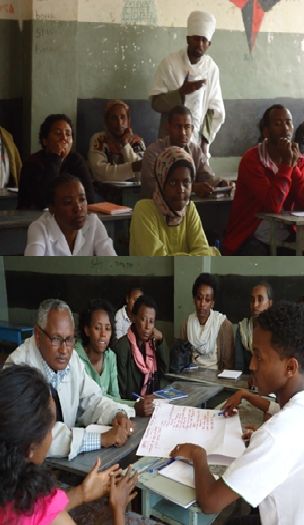Gender-Based Violence's (GBV) and Awareness Raising
 Awareness-raising is a process that seeks to inform and educate people about a topic or issue with the intention of influencing their attitudes, behaviors, and beliefs towards the achievement of a defined purpose or goal. GBV is a cross-cutting issue in all EDA projects.
Awareness-raising is a process that seeks to inform and educate people about a topic or issue with the intention of influencing their attitudes, behaviors, and beliefs towards the achievement of a defined purpose or goal. GBV is a cross-cutting issue in all EDA projects. 1. It can mobilize the power of public opinion in support of an issue and thereby influence the political will of decision-makers.
2. There are multiple awareness-raising strategies, methods, and tools that can be used to convey and spread messages, and to gather the support necessary to influence public opinion.
Depending on the topic, awareness-raising efforts may include the following activities: IEC materials, Radio, TV and other media outlets. issuing press releases, briefings, and commentaries; disseminating reports, studies and publications; making written or oral submissions to local governments and committees; working with the media; holding public meetings and events; convening conferences and workshops; and creating and contributing to educational materials.
3. Information may be disseminated through a range of different means or tools such as radio, television, video, film, the internet, social media, mobile phones, newspapers, newsletters, leaflets, poster campaigns, and the arts. A variety of visual tools such as stickers, logos,
T-shirts, armbands, bracelets, and banners may also be used. According to EDA annual, over 3 million target communities are reached.
Why is it important?
Awareness-raising and dissemination of information to the society that EDA is operating, general public, local government stakeholders, donors community and law enforcement institutions, and like-minded organizations about the SDGs is critical to create an enabling environment for accountability, promote participatory and inclusive processes for follow-up and review, and build ownership of the 2030 Agenda. For example, awareness-raising can be used to promote an understanding of existing access to education, health challenges, child rights, equalities, inclusiveness, and rights in relation to the SDGs as well as opportunities to participate in public consultations on issues related to the community. EDA has a strong passion that Empowerment is necessary in order for citizens to be able to hold their government accountable for their development at all levels. All people – including marginalized and vulnerable groups – should be aware of and understand the commitments their government has made under the 2030 Agenda and how they can meaningfully engage in SDG implementation and accountability processes. Raising public awareness of the SDGs is also essential to foster the political and social change needed to achieve the ambitious agenda.